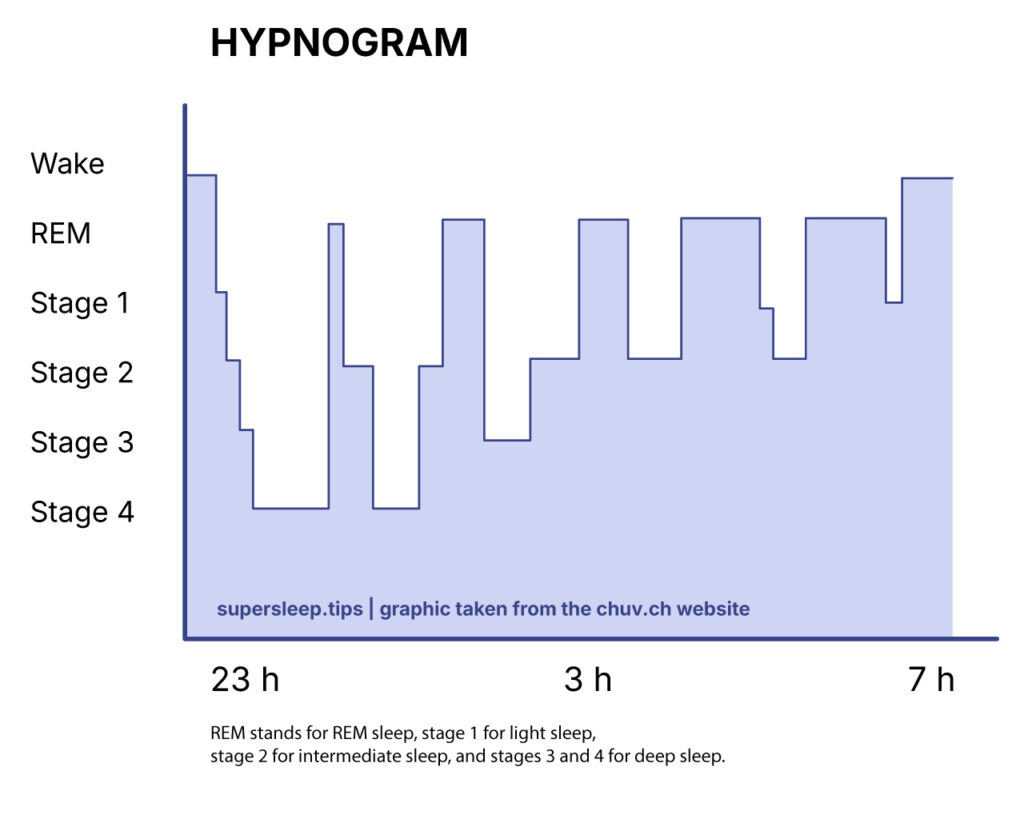Sleep, often considered a passive rest period, is actually an incredibly active time for both the body and mind. While we sleep, our brain and body go through several sleep cycles, each playing a crucial role in physical, mental, and emotional regeneration. Understanding these cycles can help you better grasp your sleep quality and optimize your sleep habits for overall well-being. In this article, we’ll explore in detail the sleep cycles, their different stages, and their importance for our overall health.
What Is a Sleep Cycle?
A sleep cycle lasts an average of 90 to 120 minutes and consists of several distinct stages, divided into two main categories: non-rapid eye movement (NREM) sleep and rapid eye movement (REM) sleep. During a full night’s sleep, we typically go through 4 to 6 sleep cycles, each cycle consisting of several stages.
The Stages of Sleep

Each sleep cycle is divided into several stages. These stages alternate between NREM sleep and REM sleep. Here are the main stages of a sleep cycle:
Stage 1: Light Sleep (NREM – Stage 1)
Stage 1 of NREM sleep is the transitional phase between wakefulness and sleep. It usually lasts a few minutes and accounts for about 5% of total sleep.
- Characteristics:
- Muscles begin to relax, but you can still be easily awakened.
- You may experience muscle twitches or a sensation of falling.
- Brain activity slows down, but remains active.
Stage 2: Light Sleep (NREM – Stage 2)
Stage 2 is a light sleep phase that makes up about 45% of the night. While you are more deeply asleep than in stage 1, you can still be awakened relatively easily.
- Characteristics:
- Body temperature decreases slightly.
- Heart rate slows down.
- Brain activity continues to slow, with bursts of “sleep spindles” (brief bursts of brain activity) that help protect the brain from being interrupted during sleep.
Stage 3: Deep Sleep (NREM – Stage 3)
Stage 3 is known as deep sleep or slow-wave sleep. This is a critical phase for physical recovery and accounts for about 15-20% of your night.
- Characteristics:
- During this phase, the body repairs muscles and tissues, stimulates cell growth, and strengthens the immune system.
- The brain produces delta waves, which are slow brain waves associated with deep sleep.
- You are very difficult to wake, and if awakened, you may feel disoriented or groggy.
Stage 4: REM Sleep (Rapid Eye Movement)
REM sleep is the phase during which the most vivid dreams occur. This phase makes up about 20-25% of total sleep in adults. Unlike NREM stages, brain activity during REM sleep is more similar to wakefulness, which is why it is referred to as “paradoxical sleep.”
- Characteristics:
- Rapid eye movements occur beneath closed eyelids, hence the name REM.
- The body is generally paralyzed (muscle atonia) to prevent movement during dreams.
- This phase is essential for memory consolidation, emotional processing, and learning.
- Heart rate and breathing become irregular.
REM sleep is particularly important for mental and emotional well-being. During this phase, the brain processes the information gathered during the day, helping to reinforce memories and deal with emotional experiences.
How Sleep Cycles Evolve Throughout the Night
At the start of the night, sleep cycles are dominated by deep sleep (stage 3), which is essential for physical regeneration. As the night progresses, the time spent in deep sleep decreases, while the duration of REM sleep increases.
- First half of the night: The cycles contain more deep sleep, allowing the body to regenerate and repair itself.
- Second half of the night: Sleep cycles contain more REM sleep, with longer phases. This is when the brain focuses on memory consolidation and emotional processing.
This explains why waking up in the middle of the night or experiencing sleep deprivation often negatively impacts cognitive abilities and mood the next day.
The Importance of Sleep Cycles for Health
Each stage of sleep performs specific, vital functions for physical and mental health. It is crucial to go through all the cycles to truly experience restorative sleep.
- Deep sleep (stage 3) is vital for physical regeneration. It is during this phase that the body releases growth hormones, repairs tissues, and strengthens the immune system. A lack of deep sleep can lead to physical fatigue, slower muscle recovery, and a weakened immune system.
- REM sleep is essential for mental regeneration and emotional regulation. A lack of REM sleep can cause irritability, concentration problems, and memory issues. People deprived of REM sleep also have a harder time managing stress.
How to Improve Your Sleep Cycles
To optimize your sleep cycles and ensure you spend enough time in each phase, here are some practical tips:
- Maintain a Regular Sleep Routine
Try to go to bed and wake up at the same time every day, even on weekends. This helps regulate your biological clock and ensures more regular sleep cycles. - Create a Sleep-Friendly Environment
Make sure your bedroom is quiet, dark, and at a comfortable temperature. Use blackout curtains, a sleep mask, or earplugs if necessary to improve sleep quality. - Limit Stimulants
Avoid caffeine, nicotine, and heavy meals late in the day. These substances can disrupt the onset of sleep and prevent your body from reaching deep sleep stages. - Engage in Physical Activity
Regular exercise can help you enter deep sleep more quickly. However, avoid intense exercise right before bed, as it may increase arousal and delay falling asleep. - Manage Stress
High stress levels can disrupt sleep cycles. Techniques such as meditation, deep breathing, or yoga can help calm the mind and body, promoting better sleep quality.
Sleep Cycles, Essential for Your Well-Being
Sleep is much more complex than a simple state of rest. Understanding the different sleep cycles and their importance is the first step to improving your sleep quality. By maintaining a regular sleep routine and creating a sleep-friendly environment, you can optimize your sleep cycles and enjoy the restorative benefits of each phase. A good night’s sleep, with complete and balanced cycles, is essential for maintaining a healthy body and a peaceful mind.

